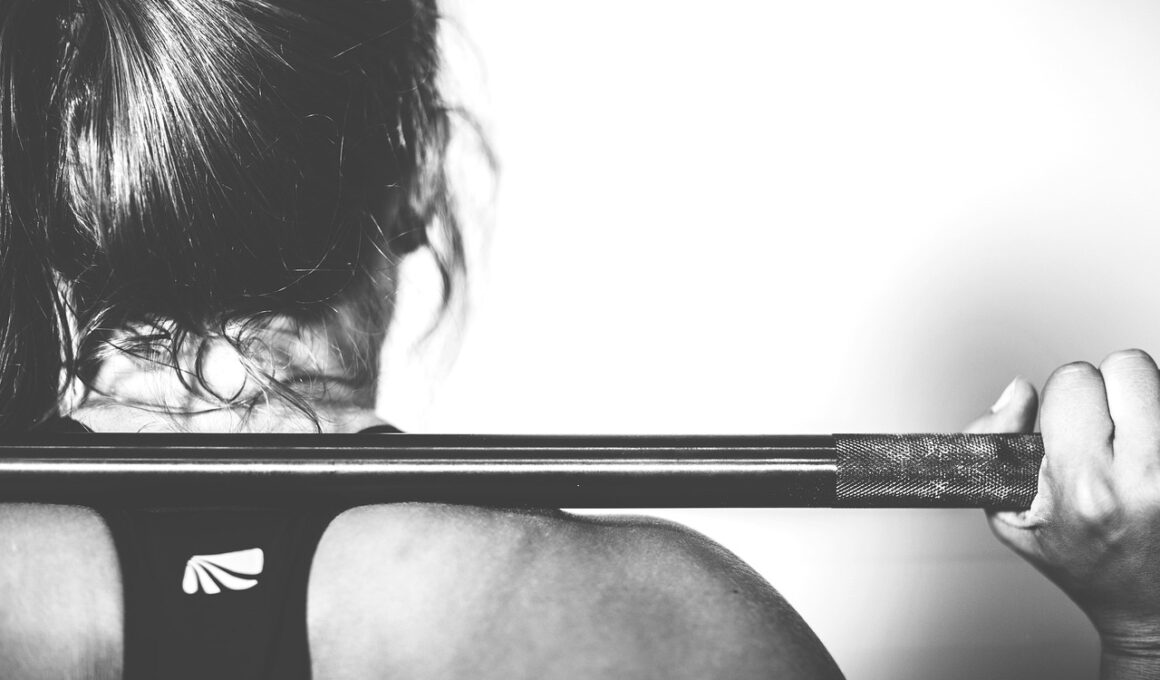Embracing Discomfort: Training Your Mind for CrossFit Challenges
CrossFit is a demanding sport that challenges physical abilities and mental fortitude. For many, the true battleground exists in the mind. Mental toughness is crucial to achieving success in CrossFit. This article discusses how embracing discomfort can significantly improve performance. Athletes must learn to accept the pain and challenges that accompany intense workouts. Success in this sport often involves pushing beyond comfort zones. By confronting physical discomfort head-on, individuals gradually build their resilience. One effective method of developing this mental strength is visualization. Athletes can imagine themselves overcoming obstacles during workouts. Setting small, achievable goals also helps to foster a winning mindset. When athletes reach these tiny milestones, they gain confidence and motivation. As these mental skills develop, CrossFitters will find themselves increasingly able to maintain their focus under stress. This increased concentration leads to improved performance during competitions. As athletes train their minds, they unlock new levels of endurance. Ultimately, wrestling with discomfort will yield long-term benefits, enhancing overall athletic performance and personal growth. In CrossFit, as in life, it is these moments of vulnerability that pave the way to extraordinary achievements.
The Importance of Mental Toughness in CrossFit
Mental toughness is not just a buzzword; it is an essential ingredient for success in CrossFit. Training hard is mandatory, but what sets athletes apart is their mindset when faced with adversity. Difficult moments in workouts can lead to self-doubt and hesitation. Recognizing and confronting these feelings is vital for better performance. Mental toughness allows athletes to push through barriers that seem insurmountable. One technique to strengthen this aspect is practicing self-affirmation. According to studies, positive self-talk can boost performance significantly. Incorporating affirmations during workouts shifts focus away from negativity towards determination. Additionally, embracing a growth mindset plays a crucial role. Athletes should view failures as opportunities for learning rather than obstacles. Every bad workout or missed rep can serve as a lesson in resilience. Committing to a consistent training schedule can aid this development. Over time, mental barriers begin to dissolve, paving the way for greater achievements. As the athlete becomes mentally tougher, their ability to handle stress increases naturally. This transition not only optimizes performance but also enhances personal satisfaction. Special evidence has shown that mentally strong individuals tend to remain undeterred in the face of significant challenges and setbacks.
One of the most practical ways to build mental toughness in CrossFit is through exposure. Regularly subjecting oneself to discomfort during workouts fosters resilience. This includes tackling difficult WODs, experimenting with heavy lifting, or participating in competitions. The more frequently athletes face challenging situations, the better they become at handling them. Also, finding a supportive community can significantly enhance this aspect. Surrounding oneself with like-minded individuals encourages a culture of positivity and strength. Training with a partner or group helps provide motivation during difficult moments. Whether attempting personal bests or combating fatigue, companionship boosts morale. Another vital component of mental toughness is mindfulness. Practicing mindfulness techniques improves focus and calmness under pressure. This can involve breathing exercises or meditation to reduce anxiety before, during, and after workouts. Athletes can also keep a journal to track their thoughts and experiences during training. Analyzing these reflections helps identify areas for improvement while reinforcing progress made. Overcoming challenges takes time and effort, leading to gradual change. Ultimately, adopting these techniques leads to a more resilient and confident athlete capable of thriving in CrossFit and other life challenges.
Recovery is as important as training when discussing CrossFit mental toughness. Achieving balance is key. Strategies need to incorporate not only physical recovery but also mental rejuvenation. Athletes often underestimate the impact of fatigue on their mental state. Proper rest and active recovery periods foster a more resilient mindset. Scheduling regular recovery days allows the mind to recalibrate for upcoming challenges. Engaging in low-intensity activities, like yoga and walking, supports both body and mind. Nutrition plays a vital role here as well. A balanced diet, rich in nutrients, supports mental clarity and overall performance. Also, ensuring adequate hydration contributes to cognitive functioning. Supplementation can be beneficial, particularly in improving focus and energy levels. Building mental toughness also requires self-compassion. Recognizing that it is okay to take breaks contributes positively to mental health. Understanding personal boundaries allows athletes to push themselves without risking burnout. Developing emotional intelligence will enrich athletes’ understanding of their own mental processes. In managing their reactions to discomfort, they become proactive rather than reactive. This approach facilitates a long-lasting commitment to health and athleticism. Establishing routines of recovery and support leads to enhanced mental strength over time.
Facing the Fear of Failure
Fear of failure is a common challenge for many athletes, especially in a high-stakes environment like CrossFit. Learning to confront this fear is essential for the development of one’s mental toughness. Failure is often perceived negatively, yet it can be a powerful teacher. Embracing the notion that failure (even in competition) serves to build strength fosters a significant shift in perspective. Athletes should recognize that each unsuccessful attempt carries valuable lessons. Shifting focus away from the results and towards the process fosters a healthier mindset. Participants in CrossFit can benefit from learning about famous athletes who failed before achieving greatness. Stories of perseverance often remind us that struggles are integral parts of success. Creating a supportive environment that encourages risk-taking can help decrease the fear of failing. Sharing experiences with injuries or missed goals can lead to healing and growth among peers. Another method to combat this fear is creating specific action plans. By breaking ambitious goals into smaller tasks, athletes will experience gradual achievements. This can boost their confidence significantly. As they conquer their fears, athletes will also find new techniques to exceed their limits and performance expectations overall. Recognizing the value in all experiences, including failures, nurtures a thriving competitive spirit.
Another way to develop a tough mindset involves accepting discomfort as an integral part of the CrossFit journey. Many associate physical pain with weakness, but overcoming discomfort is a badge of honor in the CrossFit community. Athletes must learn to listen to their bodies while pushing limits. Understanding the difference between discomfort and injury is crucial for training safely. Embracing discomfort means seeking out challenging workouts that test endurance and strength. Commendably, the infamous “Murph” is a popular choice that exemplifies this. The workout requires determination, commitment, and grit to complete. These experiences create a bond among participants, leading to greater resilience within the community. As athletes frequently confront discomfort, they inadvertently sharpen their mental skills. Gradually, workouts that once seemed insurmountable become manageable. The brain learns to associate tough workouts with achievement and growth rather than pain and failure. Sharing personal experiences during workouts helps to foster camaraderie. Each athlete’s story contributes to a collective understanding of what it truly means to embrace hardship for self-improvement. This challenging journey ultimately cultivates a culture of toughness that enhances performance. Acknowledging the importance of accepting discomfort empowers athletes on their pathways to success.
The Path to Continuous Improvement
Mental toughness is not merely a checkbox; it is a continuous journey found within the realm of CrossFit. Embracing a philosophy of continuous improvement leads to powerful transformation. Setting intentions and refining goals regularly is essential. Athletes should regularly evaluate their progress and modifying their training plans as needed. A proactive approach allows for flexibility in response to changing circumstances. Emphasizing the importance of holistic development also means addressing both mental and physical aspects. Using cross-training techniques builds adaptability and enhances overall performance. Varied workouts keep the excitement alive and contribute positively to mental engagement. Athletes must commit to a lifelong process of learning, growth, and adaptation. Staying open to new perspectives, training methodologies, and fitness trends provides opportunities for exploration. This includes training under experienced coaches and gaining insights from passionate communities. Engaging in educational resources, like books and seminars, contributes to developing a robust mindset. The importance of personal experience cannot be overstated; learners refine strategies through the practice that resonates. Together, these elements forge a resilient athlete prepared for intense challenges ahead. Establishing connections between mental toughness and performance becomes evident, leading to achievements that extend beyond physical capabilities.
Embracing discomfort and honing mental toughness is a valuable pursuit. The benefits extend beyond CrossFit into everyday life. Athletes often find that developing resilience allows them to tackle challenges in various areas, such as work and relationships. The growth mindset cultivated in the gym encourages individuals to approach difficulties with less anxiety. This enriches personal connections and problem-solving skills, fostering collaboration and innovative thinking. Being accountable to oneself and others in a community facilitates personal growth and long-term success. Practicing mental toughness also instills discipline and determination, essential attributes in all pursuits. As athletes learn to embrace discomfort, they also learn the importance of prioritizing self-care for maintaining mental health. Building mental resiliency shapes a stronger identity, while navigating external stresses with greater ease. CrossFit serves as a transformative experience, leading individuals to become the best versions of themselves, both physically and mentally. Ultimately, the journey of growth is continuous, and opportunities abound. Therefore, setting new challenges keeps motivation high. Individuals who embrace this concept inspire others to embark on their own journeys, fostering a ripple effect of empowerment. Overall, cultivating mental toughness equips athletes with the tools necessary for lifelong achievement and fulfillment in all aspects.


